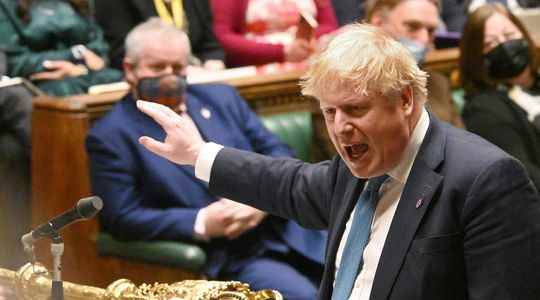Boris Johnson seized on the Ukrainian crisis with the determination of those who see in the misfortune of others a way of making their own problems forgotten. Erased, or almost, the scandals linked to libations and parties in Downing Street in full confinement, the British Prime Minister now has the leisure to deliver speeches à la Churchill and to write editorials in the conservative press in which he hammers: ” We won’t give anything to Putin.” His Minister of Defense, Ben Wallace, even let go of criticizing the diplomatic efforts of Emmanuel Macron with this contemptuous: “it smells of his Munich”, referring to the Munich agreements of 1938. The government of Boris Johnson hopes restore its image cheaply.
First very timid sanctions
National Union obliges, the Labor opposition and the Liberal Democrats, as well as the Scottish nationalists, had to silence their criticisms to make heard the united voice of Great Britain, fully in solidarity with the Ukrainian people. The first sanctions decreed by the Prime Minister (targeting only three individuals and five minor Russian banks) however seemed so timid that, faced with the outcry of many MPs of his majority, Boris Johnson had to quickly correct the situation.
In the House of Commons on Thursday, the head of government therefore announced “the package of the broadest and most severe economic sanctions ever taken against Russia”. The biggest Russian banks like VTB will have their assets frozen, every Russian citizen will have their deposits in a British bank strictly limited, high-tech exports to Russia will be reduced to a minimum and the official Russian airline Aeroflot will no longer be able to operate in Great Britain. -Brittany. Belarus is subject to similar measures.
From March 1, a hundred Russian billionaires will also see their assets frozen across the Channel. Among them, Kirill Shamalov, son-in-law of Vladimir Putin; Petr Fradko, director of Promsvyazbank and son of the former director of Russian intelligence services; Yury Slyusar, director of the United Aircraft Corporation military armaments factory. In addition, London has decided to prevent Russian companies from raising funds on British markets and the Russian state from doing the same to finance its sovereign debt.
Towards the end of “golden visas”
Another highly symbolic measure: the announcement of the end of the “golden visas” in place since 2008. To encourage foreign investment across the Channel, any individual investing more than 2 million pounds sterling (i.e. approximately 2.2 million euros) could receive a residence permit in Great Britain, a route to obtaining British nationality. More than 700 Russian millionaires have been able to benefit from it, as well as their families. The British opposition believes that this system of “golden visas” has long been used to launder dirty money. It was not until 2015 that the British administration demanded to know the origin of the funds invested.
Boris Johnson and his Foreign Minister, Liz Truss, are making more statements, boasting of being at the forefront of initiatives against the Putin regime: “The United Kingdom is leading the charge to rally international support for the ‘Ukraine and to respond forcefully alongside our allies. That is why we have been on the front line in providing defensive weapons and economic support to Ukraine.” In practice, the objective is clear: “By closing these major financial lifelines, which represent billions of pounds, we will cripple Russia’s economic development in the short and long term.” In the absence of a military commitment on the ground, London and its financial center are betting on their ability to asphyxiate the financial power of the Russian oligarchy devoted to Putin.
